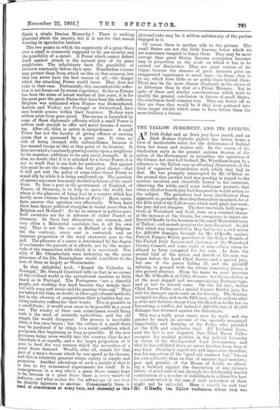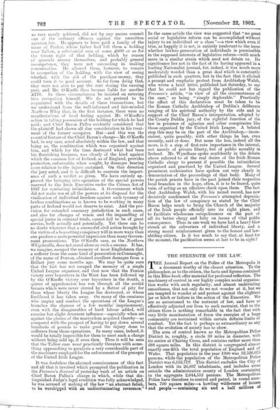THE TALLOW JUDGMENT, AND ITS EFFECTS.
AN Irish Judge and an Irish jury have struck, and an Irish Roman Catholic prelate has driven home, a blow of incalculable value for the deliverance of Ireland from her worse and weaker self. In the course of his vindication early in the present autumn Session of the action of the Government in extending the operation of the Crimes Act over half Ireland, Mr. Wyndham began by a reference to the Tallow case as affording illustration of the kind of organised intimidation with which they had to deal. He was promptly interrupted by Mr. O'Brien on the ground that another trial was pending in regard to the matters involved, and cheerfully bowed to his corrector, observing the while, amid some indignant protests, that when a third or fourth jury had disagreed he would return to the subject. The protesters had more justification than appeared, or, probably, than they themselves imagined, for at the fifth trial of the Tallow case, which took place last week, the jury did not disagree. The first two trials, held respec- tively at Waterford and Cork, were on a criminal charge at the instance of the Crown, for conspiracy to injure one David O'Keeffe in his business in the small 'Waterford town of Tallow ; and on each occasion the jury disagreed. So did that which was impanelled in May last to try a civil action for £20,000 damages brought by Mr. O'Keeffe against Patrick Francis Walsh, president of the Tallow Branch of the United Irish League and chairman of the Waterford County Council, and some eight or nine others, whom he alleged to have conspired for his ruin. In June the second trial of the action and fourth of the case was begun before the Lord Chief Justice and a special jury, but one of the jurors falling ill, and the plaintiff refusing to proceed with the eleven remaining jurors, it also proved abortive. From his name we must presume that Mr. O'Keeffe is of Celtic descent ; but his resolution is of the most dogged and uncompromising Teutonic type, and at last its reward came. On the 5th inst., before Chief Baron Panes and a special County Dublin jury, his suit for damages again came on for hearing. The hearing occupied six days, and on the 12th inst., within an hour after a clear and decisive charge from the Bench as to the law on boycotting, a verdict, not indeed of £20,000, but of £5,500 damages was returned against the defendants.
This was a really great event, even by itself, and the greater by much on account of the specially recognised impartiality and learning of the Judga who presided at the fifth and conclusive trial. All Irishmen know, and the fact is not disputed, that Chief Baron Piffles occupies his exalted position in the judicial hierarchy in virtue of his distinguished legal attainments, and that he has exhibited. there an entire freedom from bias of any kind. Peculiarly significant and impressive, therefore. was his exposition of the "good old common law," less on his own authority than on that of eminent legal members, past and present, of the House of Lords, as afford- ing a bulwark against the destruction of any citizen's liberty of mind and of act, through the deliberately hostile combination of a number of individuals to achieve his hurt by conduct which in the case of each individual of them might not be unlawful. Here it should be said that Mr. alieeffe, the Tallow tradesman whose ruin was so very nearly achieved, did not by any means commit one of the ordinary offences against the unwritten agrarian law. He appears to have paid a family of the name of Parker, whose father bad left them a holding near Tallow, a substantial sum of some £800 or so for the tenant right of that holding, which by reason of quarrels among themselves, and probably general incompetence, they were not succeeding in making remunerative. He allowed them, however, to remain in occupation of the holding, with the view of seeing whether, with the aid of the purchase-money, they could turn it to good account. So far from doing that, they were not able to pay the rent during the ensuing year. and Mr. O'Keeffe thus became liable for another £170. In these circumstances he insisted on entering into occupation himself. We do not pretend to be acquainted with the details of these transactions, but we understand from the well-informed and fair-minded Northern Whig that, in the first instance, there were no manifestations of local feeling against Mr. O'Keeffe's action in taking possession of the holding for which ho had paid ; and Chief Baron Palles evidently considered that the plaintiff had shown all due consideration in his treat- ment of the former occupiers. But—and this was the essential feature of the Chief Baron's charge—Mr. O'Keeffe had, in any case, acted absolutely within the law, and that being so, the combination which was organised aaainst him, and which for the time destroyed what had been his flourishing business, was clearly of the kind against which the common law of Ireland, as of England, provides protection, enforceable, when sought, by damages bearing some relation to the injury sustained. On that direction the 'jury acted, and it is difficult to overrate the import- ance of such a verdict so given. We have entirely ap- proved the bringing into operation of the special powers reserved to the Irish Executive under the Crimes Act of 1887 for combating intimidation. A Government which did not make use of all the powers at its disposal for the vindication of individual freedom against such tyranny of lawless combinations as is known .Co be working in many parts of Ireland would not deserve to exist. And the pro- vision for extended summary jurisdiction in such cases, and also for changes of venue and the impanelling of special juries in criminal trials, cannot fail to be of great service, both actually and potentially. Yet there can be no doubt whatever that a successful civil action brought by the victim of a boycotting conspiracy will in more ways than one produce a more powerful impression than many Govern- ment prosecutions. The O'Keeffe case, as the Northern Whig recalls, does not stand alone as such a success. It has. we imagine, escaped the memory of most Englishmen that a sufferer from the same kind of persecution in Connaught, of the name of Fenton, obtained excellent damages from a Belfast jury some months ago. We may be quite sure that the fact has not escaped the memory of a single United League organiser, and that now that the Fenton victory over boycotters in the West has been followed up by the O'Keeffe victory over boycotters in the South, a quiver of apprehension has run through all the sordid breasts which were never stirred by a flutter of pity for those whose liberty the League has destroyed, or whose livelihood it has taken away. On many of the creatures who inspire and conduct the operations of the League's branches the chances of a few months' imprisonment, even with the disagreeables of hard labour added, will exercise but slight deterrent influence—especially when set against the glories of the martyrdom acquired thereby—as compared with the prospect of having to pay down several hundreds of pounds to make good the injury done to sufferers from those operations. In many cases, indeed, it would be totally impossible for them to meet such a charge without being sold up, if even then. Thus it will be seen that the Tallow case must practically threaten with some- thing approaching to paralysis a very considerable part of the machinery employed for the enforcement of the precepts of the United Irish League.
It was doubtless the alarmed consciousness of this fact and all that it involved which prompted the publication in the Freeman's Journal of yesterday week of an article on Chief Baron Palles's charge in which, while that dis- tinguished Judge's legal erudition was fully acknowledged, he was accused of making of the law " an abstract fetish, to be worshipped with an undiscriminating reverence." In the same article the view was suggested that "no great social or legislative reform can be accomplished without injury to an individual or a, class "—a view which even if true, as happily it is not, is entirely irrelevant to the issue whether lawless persecution of individuals is permissible in the supposed interests of legislative reform—with much more in a similar strain which need not detain us. Its significance lies not in the fact of its having appeared in a leading Nationalist journal, for, indeed, it was much more moderately worded than a great deal which is constantly published in such quarters, but in the fact that it elicited a prompt and emphatic protest from Archbishop Walsh, who wrote a brief letter, published last Saturday, to say that he could not but regard the publication of the Freeman's article, "in view of all the circumstances of the case," as being " simply deplorable." Practically the effect of this declaration must be taken to be the Roman Catholic Archbishop of Dublin's deliberate ranging of his spiritual authority by the side and in support of the Chief Baron's interpretation, adopted by the County Dublin jury, of the rightful function of the law in presence of agrarian and other conspiracies like those organised by the United Irish League. A belated step this may be on the part of the Archbishop,—incon- sistent, quite possibly, with other things he has, even recently, said or done. But none the less, indeed all the more, is it a step of first-rate importance in the interest, not merely of private liberty, but of public morality in Ireland. Mr. Wyndham spoke confidently in the debate above referred to of the real desire of the Irish Roman Catholic clergy to prevent if possible the intimidation organised and practised by the United League. Several prominent ecclesiastics have spoken out very clearly in denunciation of the proceedings of that body. Many of the parish priests have in the past joined their respective local branches in the hope, often, it is to be feared, quite vain, of acting as an effective check upon them. The fact that Archbishop Walsh, with his mixed record, has now decisively condemned the Freeman's attempted deprecia- tion of the law of conspiracy as stated by the Chief Baron helps much to bring the Church of the majority of the Irish people officially into its right place, and to facilitate wholesome outspokenness on the part of all its better clergy and laity on issues of vital public consequence. Thus in one week we have had a heavy blow struck at the subverters of individual liberty, and a strong moral reinforcement given to the honest and law- abiding citizen. Is it too much to say that, at least for the moment, the pacification seems at last to be in sight ?











































 Previous page
Previous page